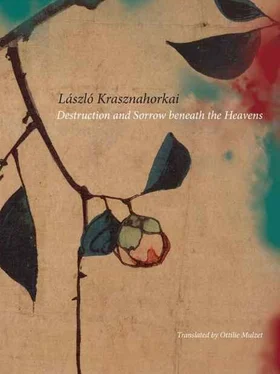And at the bottom of the page, the interpreter shows, is written the following: ‘Zither, chess, calligraphy, the art of painting.’
Wu pulls out another piece of paper, but for a long time doesn’t write anything down.
At the table, the mood is evermore high-spirited.
Wu begins to write again.
He shows the interpreter the individual characters, where he has written: ‘If you ponder the limits of decay, then the uncertainty of human life, its impermanence, shall weigh upon your soul.’
Wu pushes the two papers on the table over to Stein, smiling with a gesture that they are now his. Stein does not reach for them. Master Ji is warming up for a new performance, but this time it is not another punch line but an anecdote he is performing: in the strict sense of the word, he is enacting the various roles, representing the scene and the time when it all took place, the two women utter shrill cries of laughter. Wu pulls out a third piece of paper from his bag. He writes for a long time, his long grey hair falling into his face as he leans forward.
The interpreter shakes his head. Impossible. It’s impossible to translate. It makes no sense at all, he speaks in undertones, as if Wu could understand any of what he whispers to Stein in Hungarian. No problem — Stein motions to him — just translate.
This here, he points to the paper, is a quote from Laozi: ‘From non-existence is born existence; in existence is born non-existence.’
But after that, he says, there are just various characters.
No problem, says Stein — what do they mean?
This here, the interpreter points at the next line, that means. . wait a sec — then he reads them out continuously, as Wu wrote them down, in their entirety.
Wu gathers up the papers on the table, puts them in order, and pushes them over to Stein. Again he nods, and gestures for Stein to go ahead and take the papers. He will study them, Stein replies, and then asks the interpreter to not translate what he is about to say. He leans over to Wu, and following a gay outburst, says right into his ear in Hungarian: He doesn’t know how to explain how this is possible, but he has understood, and he understands, every single word. A friend of his recently told him to go to Suzhou. At that time he didn’t understand why. He will never forget this afternoon and this evening, he will never forget the Garden of the Masters of the Nets, this pavilion, the sunlight pouring down onto the vine-covered wall in the courtyard, he won’t forget the chirping of the birds, he won’t forget the people sitting around this table, he will never forget the aroma and taste of the Longjing tea, and he will never forget Wu, his words, the characters he has written down, his voice and his poetry.
It’s getting late — he then says to the others — he and the interpreter have to catch the last bus.
The interpreter looks at him in surprise.
The face of Master Ji grows serious for a moment, then he starts a final, very lengthy monologue in which he speaks of the immortal origin of Stein’s extraordinary name, and the extraordinary qualities of Stein who has come into their very midst. By the end, the others are clapping and bursting into laughter after each sentence. Master Ji makes his final utterance, gets up from his seat, steps over to Stein and embraces him.
Then everyone else embraces Stein.
They go out in the dark through a back entrance into the narrow alleyway.
Stein and the interpreter are accompanied to the Renmin Lu, where after another heartfelt farewell the two guests get into a taxi and head for the bus station.
You really think there’s going to be a bus leaving at midnight?
It is plain to see that the interpreter is mortally exhausted.
Stein pats him on the shoulder.
Of course there is, he says to reassure him. Of course there is.
There is always a way out of Suzhou.
And they step into the desolate building of the bus station plunged into darkness.
In the bus headed towards Jiuhuashan, there is no change. The woman at the back still sits motionlessly in her seat. Above their heads, the rain beats down on the roof of the bus mercilessly. Now even the passengers in the front are loudly grumbling about why that shabby-looking woman won’t close that bloody window. Everyone is freezing, and they are shivering in the draft coming in through the window. It really should be closed. The bus driver and the conductor, all the way in front, do not notice anything amiss. The woman takes no notice of the general dissatisfaction either, her eyes closed, she seems to be almost holding her face up to the ice-cold air streaming in.
The interpreter gets up from his seat, and speaks to her very courteously, asking her to please be so kind as to close the window, because here in the back, where they are sitting, the draft is very strong.
The woman doesn’t move, it’s as if no one had even spoken to her. She doesn’t even open her eyes.
Then in front, another passenger, a middle-aged man, seeing the half-hearted attempts of the foreigners clearly doomed to failure, makes up his mind, walks back towards the woman, pokes at her shoulder for her to wake up, and open her eyes, and says to her: Why are you doing this?
What? She asks, confused.
Why don’t you close the window? The draft is coming in.
At this the woman pulls the window in but just by a centimetre or two.
The passenger pokes her in the shoulder again.
I’m asking you again, why are you doing this? Why are you letting in the wind?
The woman turns red.
Because I like it.
What do you like?
The wind.
The man leans forward and speaks to the other passengers: She’s crazy. She has a screw loose somewhere.
With a loud grumbling they reply, fine, maybe so, but that bloody window still has to be closed.
The man grabs the handle on the window and closes it fully.
The woman says nothing. It is clear she is frightened. She’s afraid of the man.
And he doesn’t leave things there, he doesn’t go back to his seat, but remains facing her, then leans in very close, right into her face, until he catches her gaze.
So then tell me: Why do you like the wind so much?
It is clear that the woman is afraid that the man will strike her.
The wind? she repeats the question. She is really afraid. She tries to muster up some reply. No one sees the wind.
Fine, but why do you like it?
Well. . because it blows.
The man guffaws, then, as is customary with a crazy person who understands nothing at all, gestures at the woman, giving everyone to understand that she will certainly not dare to touch the window again or there will be the devil to pay, then he sits down in his seat. The passengers on the bus calm down, the bus driver pulls his bag over and takes out a snack wrapped in a plastic bag. He is a large, fat, sluggish person; he eats slowly, at his leisure. The windshield wipers squeak across the front windows of the bus. He drives with one hand, biting and chewing his food, and sometimes he leans forward, so difficult is it to see the road in the rain pouring down.
And before them, in the thick fog, supposedly there is somewhere: Jiuhuashan.
Concerning the title of the book, ‘beneath the Heavens, that which is beneath the Heavens’ (in Hungarian: Ég alatt, Égalatti; in Chinese: Tianxia), namely, ‘All that is beneath the Heavens’ was the name of the ancient Chinese for the world, which in their eyes was identical with China itself
[1] Jiuhuashan (‘The Mountain of Nine Flowers’): One of the four sacred mountains of Chinese Buddhism. Its name is derived from a line from a poem by Li Taibai, and once upon a time it was home to between 200 and 300 monasteries.
Читать дальше












